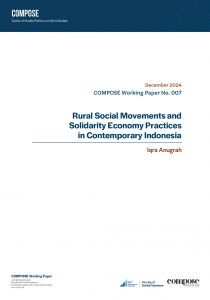Rural Social Movements and Solidarity Economy Practices in Contemporary Indonesia
 COMPOSE Working Paper No. 007
COMPOSE Working Paper No. 007
Author: Iqra Anugrah
December 2024
Introduction
Global capitalist expansion has resulted in intensive dispossession and exploitation of rural areas across the world (Bernstein, 2010). This process affects peripheral regions in the capitalist core and new frontiers in the Global South. Dynamics in the latter have been particularly visible in recent decades, where various forms of agrarian dispossession and resistance against it emerge, often in a dramatic manner. This is also true in Indonesia, a middle-income economy with long history of rural contentions. Developmentalist policies in the 1980s and the neoliberal shift in the 1990s (Lucas & Warren, 2013; Robison & Hadiz, 2004) have triggered the explosion of land conflicts and the broader struggle for rural social justice. More recently, the post-authoritarian climate of electoral democracy (1998-present) has provided new opportunities for the rural dispossessed and activists to advocate for agrarian justice. Despite the shrinking size of rural producers and economic activities, the rural world continues to exert influence on politics and development in contemporary times. For example, in the United States, regions affected by deindustrialization and free trade became the social basis for Trump’s rise in 2016 (Edelman, 2021). In Indonesia, oligarchic exploitation of rural resources has hijacked democratic processes in recent years (Jaringan Advokasi Tambang, 2019). Much of the debate on this phenomenon revolves around causes and consequences of capitalist penetration in the countryside. This includes different types of rural resistance – or non-resistance – from below. The same pattern also appears in recent academic and activist discourses on Indonesian politics, which focus on oligarchic domination and material inequality in democratic politics.
Read more: Download
 COMPOSE Working Paper No. 007
COMPOSE Working Paper No. 007